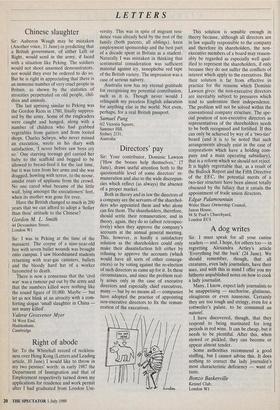Directors' pay
Sir: Your contributor, Dominic Lawson Mow the bosses help themselves,' 17 June), draws useful attention both to the questionable level of some directors' re- muneration and also to the wide discrepan- cies which reflect (as always) the absence of a proper market.
Both in theory and in law the directors of a company are the servants of the sharehol- ders who appointed them and who alone can fire them. The shareholders, therefore, should settle their remuneration; and in theory, again, they do so (albeit retrospec- tively) when they approve the company's accounts at the annual general meeting. This, however, is hardly a satisfactory solution as the shareholders could only make their dissatisfaction felt either by refusing to approve the accounts (which would have all sorts of other consequ- ences) or by voting against the re-election of such directors as came up for it. In these circumstances, and since the problem real- ly arises only in the case of executive directors and especially chief executives, many — but by no means all — companies have adopted the practice of appointing non-executive directors to fix the remun- eration of the executives. This solution is sensible enough in theory because, although all directors are in law equally responsible to the company and therefore its shareholders, the non- executive members of a board may reason- ably be regarded as especially well qual- ified to represent the shareholders, if only because they do not suffer the conflicts of interest which apply to the executives. But their solution is far from effective in practice for the reasons which Dominic Lawson gives: the non-executive directors are inevitably subject to pressures which tend to undermine their independence. The problem will not be solved within the conventional company structure. The spe- cial position of non-executive directors as representatives of the shareholders needs to be both recognised and fortified. If this can only be achieved by way of a 'two-tier' board (and it is to be noted that such arrangements already exist in the case of corporations which have a holding com- pany and a main operating subsidiary), that is a reform which we should not reject. It is highly regrettable that, as a result of the Bullock Report and the Fifth Directive of the EEC, the potential merits of a two-tier structure have been almost totally obscured by the fallacy that it entails the appointment of trade union directors.
Edgar Palamountain
Wider Share Ownership Council, Juxon House, 94 St Paul's Churchyard, London EC4










































 Previous page
Previous page